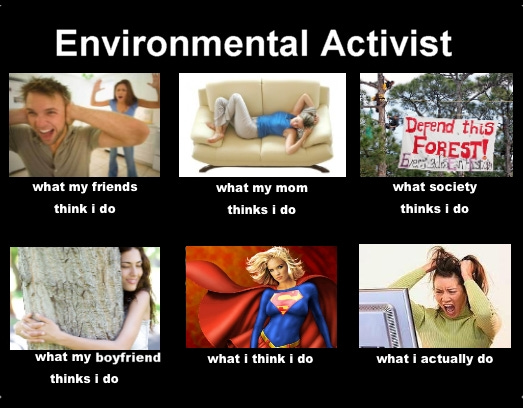Dear Climate Therapist: People’s inertia is making me feel resentful
Our climate therapist Leslie Davenport offers some tips to a reader struggling to understand why no one seems as motivated to engage in climate activism as they are
Hi, friend. If you’re wondering how you can transform your distress into small but tangible actions that help the world keep talking about the very real mental health impacts of the climate crisis, one possibility is to become a paid subscriber or if you prefer, support Gen Dread with a one-time donation through our partner, Small Change Fund. We’re so very grateful for your help. It makes a difference.
This week on Gen Dread we’re back with our Climate Therapist column, where readers write in with any question they might have about how the climate crisis is affecting them emotionally. Kyle Hill, Leslie Davenport, and Caroline Hickman make up our superteam of climate-aware therapists, and this week Leslie offers some tangible support to a reader who’s feeling frustrated with what she perceives as climate apathy in the people around her.
Ready to submit your question?
Why don’t people seem as fired up about climate as I am?
I don't know how to talk to people who don't do anything about the climate crisis. I do some form of activism almost every day and transitioned my career to climate, and it feels like I'm just yelling into the void while others sit back and let it happen. People have different lives, and of course I don't expect people to be exactly like me or reach some arbitrary purity standard that I determine. There's also no way for me to know what everyone else does or doesn't do about this. But I see so many people, including friends and family, who seem to have no desire or motivation at all to do anything about it, even when I try to talk to them or encourage them to come with me to things. It makes me feel like nothing I do matters, since the inertia and apathy of many people is so powerful there's no way I can outweigh it. How do I move away from my resentment and anger?
- The Void Has No Vacancy
Dear No Vacancy,
You’ve expressed so clearly what many of us engaged in this work experience: As with you, we can’t turn away from the climate tipping points we see right on the horizon, and we feel the visceral reality of the growing existential threat. With you, we’re committing our minds, hearts and energy to contributing to a healthier, more just world, knowing that future generations are depending on us, and wondering whether we can shift things in time. Resentment and anger so easily rise at the lack of response from others to our world on fire; and feeling grief-stricken, confused, despairing, shocked, frustrated, raging, and numb. And the pain amplifies when those we have a personal connection with seem so disconnected from this searing truth. Thank you for giving voice to this deep collective distress – it’s so important to navigate this emotional terrain together.
I’m going to offer several ways for approaching your resentment and anger that come from climate psychology’s growing body of resources. Some of them work with the focus of your time and attention, and others act directly with your thoughts and feelings. The first one is perhaps the most difficult but ultimately the most powerful. Try a few and notice what makes a difference. Keep in mind that feelings of eco-distress will likely continue to be triggered when you witness others’ inaction toward climate change, but it’s essential to find skillful ways to support our bodies, minds and emotions.
Grieve the lack of shared climate values and efforts, especially with the people that you care for and care about you. When you feel the painful gap in those core relationships around environmental commitments, pause and notice if there are other feelings in addition to resentment and anger. Honor the very real and painful loss of this longed-for unity. Are there ways to nurture these connections – hold them a little differently – growing the love even with this divide? Is there space for the possibility that some people may shift, no matter how entrenched things may be at this time?
Connect with like-minded/hearted community. We’re not meant to do the work or process the feelings alone. It’s unclear from your note whether you have colleagues or friends who are part of a mutually supportive community. Consider joining a climate café or similar community group where there’s a welcoming and encouraging environment for sharing the full range of emotional concerns, fears, and ideas.
Create room for activities that include fun, connection, and even joy. Rather than trying to distance yourself from your difficult feelings, add experiences to your days that will result in a different mix of life experiences. This won’t necessarily eliminate feelings of resentment and anger, but you can change the overall balance. This can be hard to prioritize when you understand the urgency of the climate crisis -- every moment counts. And yet professional athletes who aim for top performance are aware that recovery time is an essential component of their training. We also can’t sustain our best transformational work without time to restore or we’ll end up on the road to burnout. I’m reminded of this quote from Audry Lourde, professor and activist: “Caring for myself is not self-indulgence, it is self-preservation, and that is an act of political warfare.”
Notice those who are also invested in climate solutions, and this may require looking outside your immediate circles. Five years ago, more than six million people took to the streets – uniting across generations, time zones, and cultures – to demand urgent action on climate change. Every day more and more people are awakening to the realities of our world in crisis. With climate impacts still rising, it’s easy to dismiss successes with a “Yes but...” position. While keeping our eyes open to the hard truths, it’s also essential to register where progress is being made, build on the momentum, and welcome others who are ready to add their energy and talents.
Listen: It’s often the most overlooked part of good communication. Climate psychologist Renee Lertzman has written about climate communication and what she calls the myth of apathy. She says that climate apathy is often deep overwhelm in disguise. She suggests that we consider how we might be inadvertently stirring anxiety and ambivalence. Listen for indications of where others might naturally be ready to engage, even if they don’t use climate change language. Rather than talking to convince, she recommends offering your simple, open presence and listening for what may emerge.
I hope by practicing these kinds of supportive activities that you’ll be reenergized for the important work you’re doing. As we move together through frustration, anger, and grief, restore ourselves, stay curious and open, include joy, and build community, we’ll be better equipped to co-create new, life-supporting futures and change the broken systems from which painful eco-emotional conditions arise.
-Leslie
Click the ❤️ button on this post so more people can discover it on Substack 🙏🏼
Making Waves
Not only is the 10-Step to Resilience & Empowerment in a Chaotic Climate program by Good Grief Network back, but now you can join a special support group if you are an environmental/climate professional! Connect with others who are dedicating their lives to tackling the polycrisis and hold space for the complexity of the human experience. Sign up for the October 2nd starting session here.
‘Till next time!







I feel the same way. Especially about people who have young kids and want to have kids and doing absolutely nothing against climate change, not even talking with their kids about it. I mean, YOUR kids gonna be here in 50 years. Your grandkids even later. Why do they not care? How can they not care about the future of their kids, it's literally the only task parents have 😅
This post came at the perfect time. I have been spiraling with disgust and anger at my colleagues at the EPA who, while not in denial of the facts obviously, are clearly in denial that the facts mean we need to make changes in our lives. When I first started at the agency 20 years ago, people were almost in competition on how "green" one could be. Now no one seems to care - hey life is good in the first world - party on! Even the agency is encouraging unnecessary flight trips for work. If people aren't awake to this crisis, then they will make bad decisions, at work and in their personal lives.